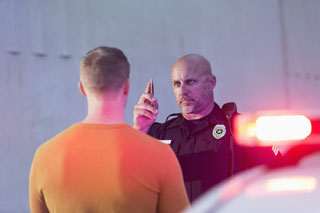Waukegan & Lake County Illinois DUI Defense Attorney

Waukegan & Lake County Illinois DUI Defense Attorney

The HoffmanLaw Office defends clients charged with DUI at the main Lake County courthouse in Waukegan, Illinois. We have over 25 years of experience with DUI cases assigned to the Waukegan courts.
Lake County DUI defense lawyer Matt Hoffman is a former Lake County Assistant State’s Attorney. He has years of former experience prosecuting Lake County DUI charges.
Whether you are charged with misdemeanor or felony DUI, or you are charged with a first, second, third or subsequent offense, we have the experience necessary to very effectively defend your case.
The HoffmanLaw Office. We question. We create. We implement. We achieve.
 HoffmanLaw
HoffmanLaw HoffmanLaw
HoffmanLawA DUI Defense Law Firm Built on a Platform of Former Prosecution Experience
A DUI Defense Law Firm Built on a
Platform of Former Prosecution Experience
















 HoffmanLaw
HoffmanLaw HoffmanLaw
HoffmanLawExperienced Criminal Defense Attorney Defending You Against DUI Charges at ALL Lake County Illinois Courthouses

Waukegan Courthouse
18 North County Street
Waukegan, Illinois 60085

Mundelein Courthouse
105 East State Route 83
Mundelein, Illinois 60060

Park City Courthouse
301 South Greenleaf Avenue
Park City, Illinois 60085

Round Lake Beach Courthouse
1792 Nicole Lane
Round Lake Beach, Illinois 60073

Vernon Hills Courthouse
24647 N. Milwaukee Ave.
Vernon Hills, Illinois 60061
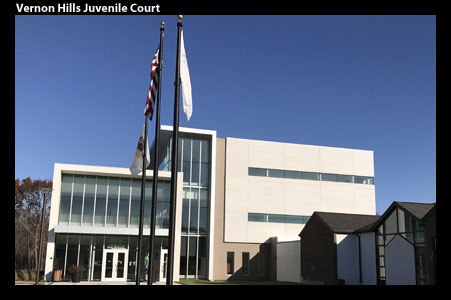



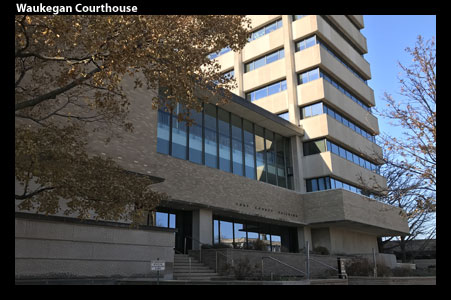

Defending You Against DUI Charges at the Lake County Courthouses in Waukegan, Mundelein, Park City, Round Lake Beach & Vernon Hills
 HoffmanLaw
HoffmanLawWe Will Put More than 25 Years of Experience to Work in Defending Your Lake County, Illinois DUI Case

Experienced Attorney Defending You Against Lake County, Illinois DUI Charges at the Waukegan Courthouse
Experienced Attorney Defending You Against Lake County, Illinois DUI Charges at the Waukegan Courthouse
Are you charged in Lake County, Illinois with DUI?
If so, your driving privileges are on the line.
Your Lake County DUI charge actually can have a wide-ranging effect on not just your driving privileges, but on many other aspects of your life.
First, DUI is a criminal offense.
As a result, your DUI charge could lead to a criminal record.
Second, your DUI charge could result in jail time.
If you are charged with felony DUI, your case could send you to prison.
Third, your DUI charge could cost you a lot of money.
According to the Office of the Illinois Secretary of State, the total average cost, after accounting for increased insurance rates, court costs, legal fees, treatment costs, driver’s license related fees, and lost wages is $18,030.00. See, 2018 Secretary of State DUI Fact Book.
Fourth, your DUI case could lead to the suspension of your driving privileges.
Under Illinois’ “implied consent law,” by choosing to drive in this State, you are presumed to have consented to testing for alcohol if you are charged with DUI.
Depending on the results of that test, or if you refuse to take it, your Illinois driving privileges might be suspended due to a “statutory summary suspension.” A statutory summary suspension can last six months, one year, or three years.
Fifth, if you are convicted of DUI your driving privileges will be revoked.
Not only could your DUI case lead to a temporary suspension of your Illinois driving privileges, but if you are convicted of DUI you will suffer the total revocation of your driving privileges.
If your driving privileges are revoked for DUI, you will never get them back unless you successfully complete an administrative hearing with the Office of the Illinois Secretary of State.
Sixth, your DUI charge could lead to higher insurance rates.
Insurance companies typically charge more to insure your vehicle if you have a DUI conviction. Also, the Illinois Secretary of State will require that you obtain SR-22 insurance as a condition of driving after a DUI conviction. SR-22 insurance generally costs more than regular insurance and often must be maintained for a three year period.
As you can see, your Lake County, Illinois DUI charge can have many negative implications. Your DUI charge can lead to a criminal record, incarceration, high costs and the loss of driving privileges.
We Defend Drivers Facing Their First-Time DUI Charge
We Defend Drivers Facing Their First-Time DUI Charge

What are the Penalties for a First DUI?
A first time DUI charge is a class A misdemeanor offense, punishable by up to a $2,500 fine and by up to 364 days in jail.
Sentences for first time DUI offenses typically require that you pay court costs, fines, attend a “victim impact panel,” obtain an alcohol evaluation and complete recommended treatment.
When other factors are added to a basic first-time DUI charge, not only do these possible penalties apply, but mandatory minimum penalties start to appear.
For instance, if, in your your first DUI case, your blood alcohol content was 0.16 or greater, a minimum fine of $500.00 and a minimum mandatory 100 hours of community service must be imposed as part of your sentence.
In another example, if, in your first or any subsequent DUI case, you are found guilty of transporting a person under the age of 16, then you are subject to 6 months of imprisonment, an additional mandatory minimum fine of $1,000, and 25 days of community service in a program benefiting children.
If You are Convicted of DUI Your Driving Privileges will be Revoked.
If you are convicted of your DUI charge, even if it is your first-ever DUI offense, the Secretary of State will revoke your driving privileges. See, 625 ILCS 5/11-501.01(d), 625 ILCS 5/6-205(b).
For a first DUI conviction, your driving privileges will be revoked for a period of one year. For a second DUI conviction within twenty years, your driving privileges will be revoked for five years. For your third DUI conviction, your driving privileges will be revoked for 10 years. For a fourth DUI conviction, your driving privileges will be revoked for life. See, 625 ILCS 5/6-208.
The Statutory Summary Suspension of Your Driving Privileges
A “statutory summary suspension” leads to the automatic suspension of your driving privileges if you were arrested for DUI and you either failed chemical testing for alcohol or drugs or you refused chemical testing. See, 625 ILCS 5/6-208.
“Failing” chemical testing is defined as having a blood alcohol content of 0.08 or more, 5 nanograms per milliliter or more of THC in your blood, or a trace of other drugs in your system.
In these circumstances, the statutory summary suspension is automatic in your case. It takes effect 46 days from the date of the “Notice of Suspension.”
The duration of your statutory summary suspension will be as follows:
• If you are a first offender and failed chemical testing, your suspension will be for six months.
• If you are a first offender and you refused chemical testing, your suspension will be for one year.
• If you are not a first offender and you failed chemical testing, your suspension will be for one year.
• If you are not a first offender and your refused chemical testing, your suspension will be for three years.
You are a “first offender” if you haven’t had a prior DUI or statutory summary suspension within 5 years of the date of your current DUI charge. See, 625 ILCS 5/11-500.
You Can Drive During Your Summary Suspension— If You Have an MDDP.
You are allowed to drive during your statutory summary suspension if you are a first offender and you comply with the requirements of the “monitoring device driving permit” [“MDDP”] program. See, 625 ILCS 5/6-206.1.
Under this program, once you obtain a monitoring device driving permit [“MDDP”], you will be required to have a “breath alcohol ignition interlock device” [“BAIID”] installed on your vehicle through the Secretary of State’s Office.
Under the program, unless you are indigent, you are required to pay the costs associated with the issuance of the MDDP and with the BAIID.
The MDDP and BAIID will allow you to drive anywhere at any time as long as you are driving a vehicle designated under the driving permit and equipped with a BAIID.
If you are not a first offender, you are not eligible for the MDDP program.
If you do not wish to participate in the MDDP program, Illinois law requires that you notify the Secretary of State that you wish to opt out of the program.
If you were eligible to participate in the MDDP program but did not, and you are caught driving during your statutory summary suspension, you can be charged with a class 4 felony offense with a mandatory minimum 30 day jail sentence. See, 625 ILCS 5/6-206.1.
You Can Challenge Your Statutory Summary Suspension in Court.
You have the right to challenge your statutory summary suspension in court. This is done by filing in the court of venue in your DUI case a “Petition to Rescind Statutory Summary Suspension” within 90 days after you were served with the notice of summary suspension.
If you demand it, the court must give you a hearing on your “Petition” within 30 days of it being filed.
If the court grants your “Petition," it will enter an order rescinding your statutory summary suspension. If the court denies your “Petition,” your statutory summary suspension will remain in effect.
Under the law, the court can consider five issues in a rescission hearing:
• Whether you were arrested for DUI;
• Whether there were reasonable grounds to believe that at the time your arrest you were driving or in physical control of a vehicle while under the influence of alcohol or other drugs;
• Whether, after being informed of the impending summary suspension, you refused to submit to chemical testing;
• Whether, after being advised of the suspension, the you submitted to chemical testing that showed an unlawful amount of alcohol or drugs in your system;
• Whether, in the case of a statutory summary revocation, you were involved in a motor vehicle crash that caused personal injury or death. See, 625 ILCS 5/2-118.1.
Court Supervision in Your DUI Case
As it has been stated here, if you are convicted of your DUI charge the Secretary of State will revoke your driving privileges.
Your first DUI charge, however, is not a mandatory conviction offense.
If you have never before been convicted of or placed on “court supervision” for DUI, or pleaded guilty to or stipulated to the facts supporting a reckless driving charge, then you are eligible to receive a sentence of court supervision in your DUI case.
“Eligible” does not mean “automatically entitled,” however.
The court must consider different factors before placing you on court supervision. See, 730 ILCS 5/5-6-1.
Most significant about a court supervision disposition is that it is NOT a conviction for DUI. It is a “deferred judgment of conviction.”
This means that if you are placed on court supervision for DUI, as long as your fulfill the requirements of your sentence, you will not be convicted of your DUI charge.
If you are not convicted, then your driver’s license will not be revoked.
Second DUI Charge
Second DUI Charge
Like a first conviction for DUI, a second conviction is a class A misdemeanor offense punishable by up to a $2,500 fine and by up to 364 days in jail.
A second DUI conviction carries a mandatory minimum sentence of 5 days in jail or 240 hours of community service. See, 625 ILCS 5/11-501(c)(2).
A second DUI conviction within 20 years also will trigger a minimum 5 year revocation of your driving privileges. See, 625 ILCS 5/6-208.
Aggravated DUI
Aggravated DUI
In Illinois, felony DUI charges are called “aggravated DUI.” There are many different types of aggravated DUI charges.
Aggravated DUI charges differ based on the facts alleged and any prior history of DUI. These charges all are punishable by time in prison.
As a group, Illinois felony DUI charges carry possible prison terms ranging from one to thirty years.
If you are convicted of aggravated DUI and not sentenced to prison, you will be required either to complete a minimum of 480 hours of community service or to serve a minimum of 10 days in jail. See, 625 ILCS 5/11-501(d)(3).
Your Third DUI Offense, a Quantum Leap in Severity
Your Third DUI Offense, a Quantum Leap in Severity
If you are charged with your third DUI, you can be charged with aggravated DUI.
While many aggravated DUI charges are class 4 felony offenses, punishable by 1 to 3 years in prison, an aggravated DUI charge alleging your third DUI offense is a class 2 felony offense, punishable by a prison sentence of between 3 and 7 years.
If your second DUI charge was charged as a class A misdemeanor, which likely it was, then your third DUI charge takes a quantum leap upward in severity in becoming a class 2 felony offense.
Even if your received court supervision for your first DUI, that first DUI charge counts toward the total in determining your number of prior DUI offenses.
So, if you received court supervision on your first DUI, and then a conviction for your second DUI, if you are charged with DUI a third time you can be charged with a class 2 felony aggravated DUI offense. Obviously, your third DUI charge can turn into a very serious case.
Other Types of Felony DUI Prosecutions at the Waukegan Courthouse
Other Types of Felony DUI Prosecutions at the Waukegan Courthouse
You can be charged with felony aggravated DUI in many other situations. In Lake County, all felony DUI charges are prosecuted at the downtown Waukegan courthouse. Some of these other types of Lake County felony DUI charges include:
DUI While Suspended or Revoked for DUI
• You are charged with DUI while your driving privileges already are revoked or suspended for DUI or for a statutory summary suspension See, 625 ILCS 5/11-501(d)(1)(G);
DUI and No Driver's License
• You are charged with DUI when you do not possess a driver’s license See, 625 ILCS 5/11-501(d)(1)(H);
DUI Without Insurance
• You are charged with DUI when you knew or should have known the vehicle you were driving was not covered by insurance See, 625 ILCS 5/11-501(d)(1)(I);
DUI and Serious Injury
• You are charged with DUI and you were involved in an accident that resulted in great bodily harm or permanent disability or disfigurement to another person See, 625 ILCS 5/11-501(d)(1)(C);
Second DUI and Kid in Car
• You are charged with your second DUI and you were transporting a person under the age of 16 See, 625 ILCS 5/11-501(d)(1)(K);
DUI and Injury to Child
• You are charged with DUI and you were involved in an accident that led to bodily harm to a person under age 16 who you were transporting See, 625 ILCS 5/11-501(d)(1)(J); or,
DUI Leading to Death
• You are charged with DUI and you were involved in an accident that led to the death of another person. See, 625 ILCS 5/11-501(d)(1)(F).
Defending Your DUI Case at the Waukegan Courthouse
Defending Your DUI at the Waukegan Courthouse
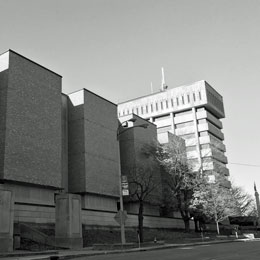
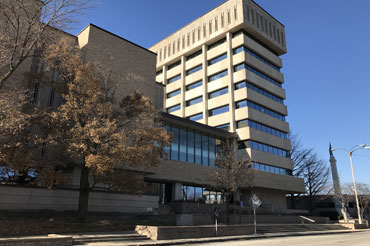
Your DUI charge is a criminal offense. A criminal offense is an offense that can result in time in jail or prison.
A misdemeanor DUI charge can result in jail time. A felony DUI charge can result in a prison sentence.
All Lake County DUI charges are assigned to the main Lake County criminal courthouse in downtown Waukegan.
You are Presumed Innocent of the Charges Against You.
As in any other criminal case, in your Lake County, Illinois DUI case you are presumed innocent of the charges against you.
If your DUI case goes to trial, the burden of proof is on the prosecution.
The burden of proof is beyond a reasonable doubt. This means the prosecution is required to prove each and every element of the offenses alleged beyond a reasonable doubt.
If the prosecution fails to meet that burden, then you should be found not-guilty of the charges against you.
You Do Not Have to Prove Your Innocence
You are never required to prove your innocence. Nor are you required to put on a defense, to present any evidence or call any witnesses, or to testify on your own behalf.
If your DUI case does proceed to trial, you will have the option of putting on a defense case. You will have the option of calling witnesses to testify in your case. You will have the option of taking the witness stand and testifying under oath to your version of what happened.
Seven Different Ways of Being Charged with DUI
Seven Different Ways of Being Charged with DUI
DUI criminalizes driving or being in actual physical control of a vehicle anywhere in the State of Illinois under certain circumstances.
Under the law, there are seven different situations in which you can be charged with DUI. See, 625 ILCS 5/11-501(a)(1) through (a)(7).
• You are under the influence of alcohol;
• The alcohol concentration in your breath, blood or urine is 0.08 or more;
• You are under the influence of an intoxicating compound to an unsafe degree;
• You are under the influence of a drug or combination of drugs to an unsafe degree;
• You are under the combined influence of alcohol, drugs or intoxicating compounds to an unsafe degree;
• You have any amount of a drug, substance or compound in your system resulting from your unlawful use of that product; or
• Within 2 hours of driving or being in actual physical control of a vehicle you have an unlawful concentration of THC in your system.
You Can Challenge the Results of Your Chemical Tests
You Can Challenge the Results of Your Chemical Tests
As you can see, DUI charges can be based on alcohol or drug consumption, or on consumption of alcohol and drugs combined.
In cases where the police collected a breath, blood or urine sample from you, the prosecution can attempt to admit the results of chemical testing of those substances as evidence against you at trial.
For instance, if you submitted to a chemical breath test at the police station after you were arrested for DUI, the result of that test can be used against you at trial. See, 625 ILCS 5/11-501.2.
However, even if the prosecution has evidence you tested over the legal limit, that evidence is not automatically admissible against you at trial.
You have the right to challenge the prosecution's use of that evidence.
Three Standardized Field Sobriety Tests
Three Standardized Field Sobriety Tests
If you are charged with DUI, you may have submitted to field sobriety testing out on the street.
In Illinois, the results of your performance on three different field sobriety tests can be used against you as evidence of alcohol intoxication at trial.
These three tests are known as “standardized field sobriety tests,” as approved by the National Highway Safety Transportation Administration (“NHTSA”).
They include the horizontal gaze nystagmus test (“HGN”), the one-legged stand test, and the walk-and-turn test. The results of these tests are not, however, automatically admissible in the prosecution's case. You have the right to challenge the prosecution's use of these tests at trial.
Horizontal Gaze Nystagmus Test ("HGN")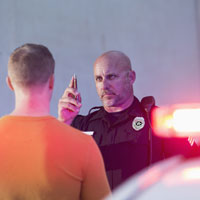
Police use the horizontal gaze nystagmus test to check if your eyes bounce or jerk involuntarily when you look to the side. Alcohol consumption increases this type of movement. As a depressant of the nervous system, alcohol impedes your eyes’ ability to track smoothly side-to-side in a controlled manner.
When conducting the horizontal gaze nystagmus test, police officers look for three clues in your eyes: lack of smooth pursuit, distinct nystagmus at maximum deviation, and onset of nystagmus prior to 45 degrees.
In conducting HGN test, a police officer typically holds a pen, penlight, or finger twelve to fifteen inches in front of your face. The officer then asks you to follow that object with only with your eyes while he or she moves it from side to side.
Lack of smooth pursuit occurs when your eye does not follow the object smoothly as it moves from the center of your face toward your ear.
Distinct nystagmus at maximum deviation is observed when your eye shows a jerking motion when you hold it at its outer edge for four seconds.
Onset of nystagmus at 45 degrees is shown when your eye jerks before 45 degrees from the center of your face while the officer moves the object toward your shoulder.
One-Legged Stand TestLike the HGN, the one-legged stand test is a standardized field sobriety test, the results of which may be admissible against you in a DUI trial.
The one-legged stand test is a divided attention test. It requires you to divide your attention between listening to and following oral instructions of a police officer and balancing on one foot for thirty seconds.
To perform the one-legged stand test, you must balance on one foot while raising your other foot six-inches off the ground and keeping your toes pointed.
You must then count by thousands up to thirty while maintaining your balance. You are required to keep your arms at your sides during the test.
The police officer observing the test will look for signs of impairment.
Signs of impairment demonstrated by the test include: lowering your foot before the test is finished, using your arms for balance, swaying while trying to hold your balance, or hopping during the test.
Walk-and-Turn TestThe walk-and-turn test is another divided attention standardized field sobriety test. Its results may be admissible against you in a DUI trial.
To perform the walk-and-turn test, you must take nine steps, heal-to-toe, in a straight line. After the ninth step, you have to turn around on one foot and walk nine steps back the same way.
The police officer conducting this test will watch you for signs of impairment.
These signs include: being unable to maintain your balance while listening to the officer’s instructions, starting to walk before the officer tells you to start, stopping while walking to catch your balance, not touching your feet heal-to-toe, using your arms for balance, losing your balance as you turn around, and taking an incorrect number of steps.
You Can Challenge the Results of Field Sobriety Tests
You Can Challenge the Results of Field Sobriety Tests
Lake County police are trained to administer the HGN, one-legged stand, and walk-and-turn-tests to drivers they suspect are alcohol-impaired.
For the results of these tests to be admissible against you at trial, the police officer who performed them must have done so exactly as required.
If the police officer deviated from the protocol in administering a test, then the prosecution should be prohibited from using evidence of that test against you at trial.
Non-Standardized Field Sobriety Tests
Non-Standardized Field Sobriety Tests
There are also non-standardized field sobriety tests. These include the finger-to-nose test, counting backward test, alphabet test and others.
Non-standardized field sobriety tests cannot be used against you at trial. In some cases, they can be used as evidence of “probable cause” that you were under the influence of alcohol.
Portable Breath Testing Device
Portable Breath Testing Device
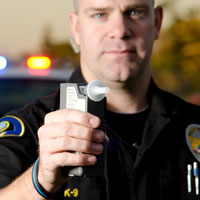
Out on the street, in addition to having performed field sobriety tests, you may have blown in to a portable breath test (“PBT”) device.
The PBT captures a sample of your breath and tests it to measure your blood alcohol content. The police generally claim the results of this testing device are extremely accurate.
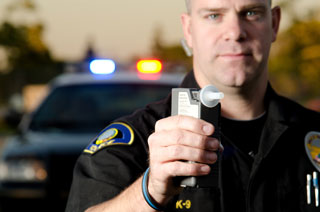
PBT results may be admissible to show the police had probable cause to arrest you for DUI. However, the prosecution is not permitted to use the results of a PBT to prove DUI charges against you at trial. See, 625 ILCS 5/11-501.5.
 HoffmanLaw
HoffmanLaw HoffmanLaw
HoffmanLawA Passion for Defense
A Passion for Defense
What is DUI?
What is DUI?
Driving or Being in Actual Physical Control of a Vehicle
While Under the Influence of Alcohol or Drugs
Or with an Unlawful Concentration of Alcohol or Drugs in Your System.
Why Choose The HoffmanLaw Office to Defend Your Lake County DUI Case?
Why Choose The HoffmanLaw Office to Defend Your Lake County DUI Case?

Analysis.
The HoffmanLaw Office always is focused on the presumption of innocence. Building on this presumption, The HoffmanLaw Office performs a systematic and searching ANALYSIS of the facts alleged in your case. This intensive analysis exposes weakness in the prosecution's evidence and develops powerful defense arguments and strategies.

Preparation.
The HoffmanLaw Office strives to know completely the facts and law of your case. In criminal court, good results do not often emerge by chance. They come through intense PREPARATION that lays the groundwork for success. When you select The HoffmanLaw Office as your legal advocate, you team yourself with a philosophy of extreme preparation.

Results.
The HoffmanLaw Office views every time it appears in court with you as an opportunity to achieve RESULTS. Whether it is negotiating during a pretrial conference, cross-examining a witness, or delivering a closing argument at trial, The HoffmanLaw Office strives to be your best advocate at all times.
Facing Lake County Illinois DUI Charges?
 HoffmanLaw
HoffmanLaw HoffmanLaw offers more than 25 years of Lake County Illinois criminal trial experience.
HoffmanLaw offers more than 25 years of Lake County Illinois criminal trial experience. HoffmanLaw
HoffmanLaw
So You've Been Charged with a Lake County DUI?
So You've Been Charged with a Lake County DUI?
You face a statutory summary suspension of your driver’s license and the possible revocation of your driving privileges.
How will The HoffmanLaw Office work on defending you Lake County DUI case?
We'll start by ASKING QUESTIONS. Just some of the questions we'll ask about your case are:
• What do your charges allege?
• Are you accused of driving under the influence of alcohol? Of drugs? Of some combination of alcohol and drugs?
• Are you also charged with driving with a blood-alcohol concentration of 0.08 or above?
• Did the police stop your vehicle while you were driving?
• Or were you parked when the police found you?
• Are you charged not with driving but with being in “actual physical control?”
• If the police stopped your vehicle, what was their reason for pulling your over?
• In addition to being charged with DUI, are you charged with speeding?
• With improper lane use?
• Was there an accident involved in your case?
• Did the police video record you driving and your traffic stop?
• If they did, can the prosecution be compelled to turn over copies of those recordings for your review in preparation of your defense?
• Should any court orders be pursued commanding the police to preserve this evidence?
• When they spoke to you at the scene of your traffic stop, did the police claim they noticed an odor of alcohol on your breath?
• If yes, do they claim the odor was weak, or moderate, or strong?
• Do the police claim they noticed an odor of alcohol coming not from you, but instead from the inside of your vehicle?
• Do the police claim your eyes were glassy or you speech was slurred?
• Did you have any difficulty giving the police your driver’s license or your proof of insurance?
• At the scene of your traffic stop, did you admit to drinking or using drugs?
• If the police ordered you to exit your vehicle, did you have any difficulty getting out of your car?
• Did you have any difficulty walking or maintaining your balance?
• Did the police ever search your vehicle? If so, did they find alcohol or open alcohol or any drugs inside?
• Did you perform field sobriety tests or refuse to do so?
• If you refused to take any tests out on the street, were you then immediately arrested?
• If you did take field sobriety tests, did the officer explain and demonstrate them to you before you took them?
• In your opinion, how did you perform on these tests?
• What tests did you take? The HGN? The one-legged-stand? The walk-and-turn?
• Was the police officer who administered these tests trained to conduct them?
• Did the officer perform the tests in accordance with his training?
• If you took those standardized field sobriety tests, did any medical condition impair your ability to have successfully completed them?
• Were did the police conduct these tests? On the street? On a sidewalk? On a grassy parkway?
• Was the surface where you completed these tests smooth or bumpy?
• Was it paved? Or concrete? Or gravel?
• What type of shoes were you wearing when you took the field sobriety tests?
• Was the surface on which you completed field sobriety tests wet or dry?
• What were the weather conditions at the time?
• Was it raining? Snowing?
• Was it windy or calm?
• How were you dressed?
• Did the police video and audio record your performance of field sobriety tests?
• If so, can the prosecution be required to turn over copies of these recordings for your review in your defense?
• Had you worked the entire day before you were pulled over? Were you tired?
• Did you take any non-standardized field sobriety tests, like the alphabet test, a counting test, the finger-to-nose test, the “hand pat” test, or any other test?
• If so, how did you do on those other tests?
• Did you submit to a portable breath test ("PBT") out on the street?
• If so, what was the alleged result of the PBT?
• If you took them, what did the police say to you to get you to take field sobriety tests?
• If you took it, what did the police say to you to get you to take the PBT?
• Did the police handcuff you after you completed field sobriety tests or the PBT?
• Did the police question you about the offense after you were under arrest?
• If so, did the police read you your Miranda rights before they questioned you?
• When did you believe you were under arrest?
• What statements did you make to the police, either before or after you were under arrest?
• Did you write out a statement for the police?
• After you were arrested, where did the police take you?
• How long did it take for the police to transport you to the police station?
• Once you reached the police station, what happened?
• Did the police take you to a booking room?
• Do the police have video and audio recordings of you in their booking room?
• Can the prosecution be compelled to turn over copies of those recordings for you review?
• Did the police interrogate you about the offenses you were accused of committing?
• Did the police coerce or threaten you to get you to confess?
• At the police station, did the police read you a “Warning to Motorist Form” verbatim?
• Did this form advise you of the consequences of taking or refusing to take a chemical breath test at the police station?
• Did you understand this document?
• If the police did read you the “Warning to Motorist,” did they then wait twenty minutes before obtaining an official breath sample from you?
• Did you chew gum during this period or throw up?
• Did you eat anything during this time period?
• Did you then take or refuse to take a chemical breath test?
• If you took this test, what were the results?
• If you took a PBT out in the street, was the result reported by the chemical breath test at the police station higher or lower than the PBT?
• If you took the chemical breath test at the police station, how long before that test was your last meal?
• Was the chemical breath test machine properly tested for accuracy within 45 days of it being administered to you according to the standards of the Illinois State Police?
• Can the prosecution produce written proof that the chemical breath test device was certified as accurate?
• Was the police officer who administered this test to you trained and certified to administer it?
• Did the officer conduct the chemical breath test in accordance with his or her training?
• Can the prosecution produce a copy of the officer’s official chemical breath test operator’s cerfiticate?
• If the police claim you refused to take the chemical breath test, did you really refuse to do so?
• Did the police collect a blood or urine sample from you?
• If so, who collected that sample?
• Was the sample collected in a manner that would be admissible in a DUI trial?
• How, where and by whom was the sample tested?
• Was proper chain-of-custody maintained on the sample before it was tested?
• What were the results of that test?
• When was the sample collected in relation to the time the police first saw you in you vehicle?
Why All These Questions?
Why All These Questions?
When it comes time to start defending your Lake County, Illinois DUI case, The HoffmanLaw Office thinks it’s imperative to start asking questions. Lots, and lots, of questions.
If you’re charged with DUI, you’re charged with a criminal offense— an offense that could affect not only your record but your right to drive.
Are You Automatically Guilty As Charged? Absolutely Not.
It might seem the police have a lot of evidence against you. But that doesn’t mean you’re guilty as charged.
You're protected by the presumption of innocence.
This means you're presumed innocent of the DUI charge or charges against you unless and until either you plead guilty or you’re found guilty after a trial.
What's the Point of Asking Questions About the Evidence in Your Case?
The HoffmanLaw Office starts asking questions, and lots of questions, about your case in an effort to get to the truth.
DUI prosecutions often rely on lots of technical evidence. Most of the time, the prosecution’s “star witness” is the police officer who stopped your car.
This same police officer likely relied on his or her technical training to perform field sobriety tests. Then, this officer rendered an opinion, based on that training, on whether you passed or failed those tests.
A police officer was required to advise you of the rules governing a statuory summary suspension.
Finally, a police officer operated the chemical breath test machine at the police station.
What's clear in almost every DUI proceeding is that police conduct plays a huge role in the outcome of your case in court.
Police are professional witnesses. They're paid to do a job, to investigate potential DUI drivers in accordance with strict protocols, and to make DUI arrests.
The more QUESTIONS The HoffmanLaw Office asks about how the police investigated your case, the greater the potential for revealing problems with the prosecution’s case against you.
What if the Police Didn't Do Things Correctly?
In many cases, if it can be shown the police didn’t do things properly, then the court should prohibit the prosecution from using evidence gained by cutting corners, failing to comply with procedures, or simple oversight.
In this way, asking questions about your case is a way of raising REASONABLE DOUBT.
After all, for you to be found guilty of DUI, a criminal offense, you must be found guilty of the offense beyond a reasonable doubt.
One of the core reasons The HoffmanLaw Office exists is to work to raise reasonable doubt.
Arguments we can make in your case for the existence of reasonable doubt can lead to reduced charges, better sentences, and even dismissal of the charges against you.
The HoffmanLaw Office has more than 25 years' experience working with DUI charges in Lake County, Illinois. The HoffmanLaw Office can put that experience to work for you in defending your DUI case.
The HoffmanLaw Office. We question. We create. We implement. We achieve.
 HoffmanLaw
HoffmanLaw HoffmanLaw
HoffmanLawDefending Misdemeanor & Felony DUI Charges in Lake County Illinois DUI Court
We are Here to Help
(847) 587-5000
Call for a Free Consultation Today
Questions & Answers
Questions & Answers
What is court supervision for DUI?
If you are placed on court supervision for DUI, you have been found guilty of DUI and sentenced for DUI. You have not, however, been convicted of the charge. Court supervision is known as a “deferred judgment of conviction.” This means that if you violate the terms of your sentence of court supervision, or you fail to fulfill the requirements of your sentence, your supervision will be revoked and a conviction for the charge of DUI will enter against you. If you are convicted of DUI, your Illinois driving privileges will be revoked. Because court supervision is not a conviction, it does not trigger a revocation of your driver’s license. You can receive court supervision for DUI only once in your life.
What if I refused chemical testing?
Under Illinois law, you are presumed to have given your consent to chemical testing of your breath, blood or urine if you have been arrested for DUI. In this circumstance, if you refuse to submit to testing, you will be sanctioned for that refusal. The police are required to notify the Office of the Illinois Secretary of State of your refusal. Upon receipt of this notification, the Secretary of State is required to suspend your driving privileges in the State of Illinois, and your Illinois driver’s license, for either one full year or three full years. The length of your suspension depends on whether or not you are a “first offender.” This administrative suspension is called a “statutory summary suspension” of your driving privileges. This type of suspension can be challenged in court in your DUI case.
Can I take my case to trial?
No matter what the evidence against you, you are presumed innocent of your DUI charge. You have the right to a trial. Also, you can chose whether you want your case to be decided by a judge or a jury. If you try your case in front of a judge, then the judge will render the verdict in your case. Alternatively, if you try your case in front of a jury, then a jury of twelve people will render the verdict. In a jury trial, a guilty verdict would have to be unanimous. Because the prosecution has the burden of proof, it also has the obligation to present evidence and testimony against you. You have the right to cross-examine any of the prosecution's witnesses and to challenge all the prosecution's evidence. The burden of proof never shifts to you, so you never have to prove your innocence.
Can I plea bargain or negotiate?
Just as you can fight your DUI case through trial if you wish, you also can alternatively attempt to resolve the charges against you by negotiating. Negotiating with the prosecution for an agreed disposition in your case also is called plea bargaining. Plea bargaining should take into consideration many different factors in you case. These include your driving record, your lack of criminal history, the facts of your case, the charges in your case, your employment or work history, any history of treatment, your contributions to the community, among many others. In certain cases, negotiating for a result can avoid harsher penalties that could be impose against you by the court in the event you lost at trial.
 HoffmanLaw
HoffmanLaw HoffmanLaw
HoffmanLawA DUI Defense Law Firm Built on a Platform of Former Prosecution Experience
















Former Lake County Illinois Traffic Court Prosecutor Defending Drivers Against Tickets from these Lake County Locations and Police Departments:
Antioch, Bannockburn, Barrington, Barrington Hills, Beach Park, Buffalo Grove, Deer Park, Deerfield, Fox Lake, Fox River Grove, Grayslake, Green Oaks, Gurnee, Hainesville, Hawthorn Woods, Highland Park, Highwood, Illinois State Police Troop 3, Island Lake, Kildeer, Lake Barrington, Lake Bluff, Lake County Sheriff, Lake Forest, Lakemoor, Lake Villa, Lake Zurich, Libertyville, Lincolnshire, Lindenhurst, Long Grove, Mettawa, Mundelein, North Barrington, North Chicago, Old Mill Creek, Park City, Port Barrington, Riverwoods, Round Lake, Round Lake Beach, Round Lake Heights, Round Lake Park, Third Lake, Tower Lakes, Vernon Hills, Volo, Wadsworth, Wauconda, Waukegan, Wheeling, Winthrop Harbor, & Zion.
Former Lake County Illinois Traffic Court Prosecutor Defending Drivers Against Tickets from these Lake County Locations and Police Departments:
Antioch, Bannockburn, Barrington, Barrington Hills, Beach Park, Buffalo Grove, Deer Park, Deerfield, Fox Lake, Fox River Grove, Grayslake, Green Oaks, Gurnee, Hainesville, Hawthorn Woods, Highland Park, Highwood, Illinois State Police Troop 3, Island Lake, Kildeer, Lake Barrington, Lake Bluff, Lake County Sheriff, Lake Forest, Lakemoor, Lake Villa, Lake Zurich, Libertyville, Lincolnshire, Lindenhurst, Long Grove, Mettawa, Mundelein, North Barrington, North Chicago, Old Mill Creek, Park City, Port Barrington, Riverwoods, Round Lake, Round Lake Beach, Round Lake Heights, Round Lake Park, Third Lake, Tower Lakes, Vernon Hills, Volo, Wadsworth, Wauconda, Waukegan, Wheeling, Winthrop Harbor, & Zion.
Talk with a Former Lake County Assistant State's Attorney About Your Lake County DUI Charge Today
Experienced DUI Defense Attorney Defending You Against Misdemeanor & Felony DUI Charges at ALL Lake County Illinois Courthouses

Waukegan Courthouse
18 North County Street
Waukegan, Illinois 60085

Mundelein Courthouse
105 East State Route 83
Mundelein, Illinois 60060

Park City Courthouse
301 South Greenleaf Avenue
Park City, Illinois 60085

Round Lake Beach Courthouse
1792 Nicole Lane
Round Lake Beach, Illinois 60073

Vernon Hills Courthouse
24647 N. Milwaukee Ave.
Vernon Hills, Illinois 60061
 HoffmanLaw
HoffmanLaw HoffmanLaw
HoffmanLawHere to Defend You Every Step of the Way

Bond Court
In Lake County misdemeanor and felony cases, if you are arrested you might be brought before a judge for a bond hearing. At your bond hearing, the judge will consider the charges, the alleged facts, your criminal history, and other factors. Then the judge will set the conditions of your bond. You might be released on your signature or have to post money before you get out of jail. Your bond hearing can be the first time you appear in front of a judge in your case. The HoffmanLaw Office has more than 25 years of Lake County bond court experience in misdemeanor and felony cases. If you have been or are going to be arrested, The HoffmanLaw Office is ready to get to work quickly as your advocate at this early and important step in your case.

Preliminary Hearing
In a Lake County felony case, you have the right to a preliminary hearing or indictment. At your preliminary hearing, the prosecution will call witnesses to try to prove to a judge that there is probable cause that you committed a felony offense. If the judge finds probable cause, your case will be scheduled for arraignment. If the judge finds no probable cause, your charges will be dismissed. If no preliminary hearing is held, your case can be presented to the Grand Jury for indictment. The HoffmanLaw Office has more than twenty-five years of experience with preliminary hearing and Grand Jury issues in Lake County felony cases. The HoffmanLaw Office knows how to assert your rights during this often technical part of your case.

Arraignment
In Lake County misdemeanor and felony cases, at your arraignment the judge formally will advise you of the charges you are facing and tell you their maximum possible penalties. The judge will order the prosecution and defense to comply with discovery rules. These rules will require the prosecution to turn over copies of police reports and other written evidence. At your arraignment, you will be asked to enter a plea. Almost all arraignments include a plea of “not-guilty.” The HoffmanLaw Office has represented clients in many hundreds of Lake County arraignments. This Office knows how to defend and assert your Constitutional rights at this significant step in the court proceedings.

Pretrial Conference
A pretrial conference is a court appearance after arraignment in a Lake County misdemeanor or felony case. At a pretrial conference, the prosecution and defense can work toward reaching an agreed resolution of your criminal charges. The HoffmanLaw Office views pretrial conferences, and every other court appearance in your case, as opportunities to advocate on your behalf. There can be multiple pretrial conferences as your case moves forward. During any pretrial conference, The HoffmanLaw Office is focused on the fact that you are presumed innocent. With this presumption always in mind, this Office has many years of experience in negotiating for positive outcomes in Lake County criminal court.

Motion Practice
The HoffmanLaw Office uses pretrial motions to try to favorably alter the outcome of your criminal case. A carefully written and successfully argued pretrial motion can have a profoundly positive effect on the outcome of your case. This is especially so when, for example, the court rules your confession was involuntary, or rules you were the victim of an unlawful search and seizure, or rules you were inappropriately identified in a police lineup, or even rules your charges are so problematic they must be dismissed. The HoffmanLaw Office works hard to analyze the facts and law of your case in exploring the use of effective pretrial motions.

Trial
At its core, The HoffmanLaw Office is a trial law firm. It is built on more than twenty-five years of Lake County criminal court trial experience. If your charges do not resolve during the pretrial process, your case will go to trial. As your advocate, The HoffmanLaw Office will bring many years of Lake County criminal court trial experience to your defense. Attacking the prosecution's evidence, questioning the opinions of prosecution experts and police, and aggressively cross-examining prosecution witnesses are proven ways of raising reasonable doubt in the rigorous pursuit of a not-guilty verdict. The HoffmanLaw Office never waivers from its pursuit of your success.
 HoffmanLaw
HoffmanLaw HoffmanLaw
HoffmanLaw(847) 587-5000
FREE DUI CASE EVALUATION
FREE DUI CASE EVALUATION
 HoffmanLaw
HoffmanLaw HoffmanLaw
HoffmanLawOffice Location
2504 Washington Street Suite 200-F
Waukegan Illinois 60085

You Be the Judge.
You Be
The Judge.
Are you looking for the “Best Lake County DUI Attorney?” Or the “Best Waukegan DUI Lawyer?”
Is The HoffmanLaw Office "the best?"
We won’t say.
Calling ourselves the “best” requires us to make a claim we won’t venture to make.
We know Lake County has a number of excellent DUI attorneys. We know we're among them.
In fact, we know we're really, really good at what we do.
Why are we so good? Here's why:
• We've been working in Lake County DUI court for more than 25 years.
• We have many years of experience with both misdemeanor and felony Lake County DUI cases.
• We have significant Lake County DUI bench trial experience.
• We have significant Lake County DUI jury trial experience.
• We have the background of a former Lake County DUI prosecutor. We'll bring that experience to our defense of your case.
• We have a long track record of success in Lake County DUI cases.
• We've had DUI charges reduced.
• We've had DUI charges dismissed.
• We've had statutory summary suspensions rescinded.
• We've helped keep many clients facing serious DUI charges on the road.
So, we won’t tell you we’re the “best” to get you to retain us.
If you happen to decide we're the best, we won't argue with your assessment.


Practice Areas
Traffic Offenses
Traffic Offenses
Talk with a Former Lake County Assistant State's Attorney Today
Call (847) 587-5000 for a Free Consultation Today

